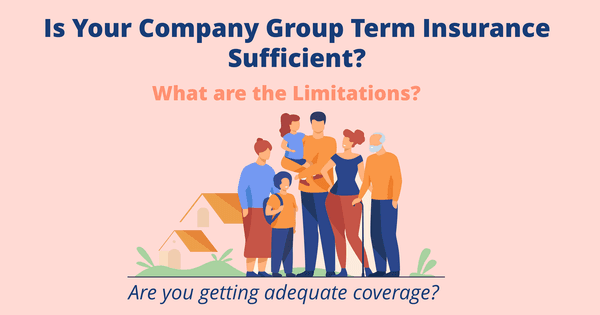Advertisement
OPINIONS
Is your Company Group Term Life Insurance sufficient?
Are you getting adequate coverage?
Michael Wong
16 Nov 2020
Seedly Student Ambassador 2020/21 at Seedly
Some employers may provide or offer protection benefits such as Group Term, Medical and Accident Insurance. This can be usually found in your employment contracts.
Today, this extract will be breaking down what a Company Group Term Insurance offers, its limitations and its alternatives.

Table 1: Group Term Insurance Vs Personal Term Insurance
Company Group Term Insurance
Some employers may provide or offer Company Group Term Insurance which can be found in your employment contracts. Company Group Term Insurance is typically offered to employees who meet certain eligibility requirements which classifies their employees as a permanent staff. It provides monetary aid in the event of death or a total permanent disability. Employers may provide a full subsidy of the policy. Alternatively, they may offer an opt-in option for employees where they subsidise the premiums for the policy.
Benefits
A large number of people subscribe into the Group Term Insurance. This allows the risk to spread across a higher number of people making the premiums cheaper than if it were an individual plan.
Limitations
Since the Group Term Insurance is taken up by the company, they are the rightful policy owners. Hence, the benefits within the plan is customised to suit their requirements first and then their employees. This often results in the most basic coverage scheme for the individual employee which may be inadequate.
The duration of the policy is effective as long as you stay employed with the Company. However, the policy will terminate if you are fired or resign from the Company.
The company (Policy Owner) may amend the policy upon renewal. What is currently covered now may be removed in the future due to changes in requirements. Coverage may be reduced or limited in the future. If there is any change(s), you might not be informed.
If the Company (Policy Owner) cancels the policy and decides not to provide this protection to employees/ members, the premiums paid will be worthless and they are not covered anymore under this policy. The danger is that if anything happens, it would be considered as a pre-existing condition and you will have exclusions in future policies.
E.g. Existing Condition (Non-Transferable)
Suppose you attained a medical condition during the Company Group policy term. Upon termination of the current policy, both the new Company Group insurance or new personal term plans will exclude the medical condition. This is one of the main reasons for medical underwriting. Insurance companies know that if they cover all pre-existing conditions they won’t be in business for long.
Therefore, when you have a pre-existing condition, getting insurance will be a challenge.
In the event of a claim, the Pay-Out is over a period of 12-24 months. Family members might not be able to pay off existing liabilities (business loan), hence, they might not gain access to your assets.
With these reasons, having a Company Group Term Insurance alone may be insufficient as it leaves a lot of gaps. This leaves you with no control over the policy.
Personal Term Insurance
Personal Term Insurance offers you a greater control over your policy at a very low price. You are able to personalise the amount of coverage (Sum Assured) and the duration of the policy term. In addition, riders (Add-Ons) which covers critical illness can be attached to the main policy. Most personal term insurance provide you the option of an automatic renewal at the end of the policy term. You are the policy owner and the policy terms are fixed upon approval. If there is any change(s), you will be informed. Unlike a Group Term Insurance, no 3rd party is able to cancel your policy. This allows you to have your pre-existing conditions to continue to be covered as long as you don’t terminate the policy.
In the event of a claim, you would be receiving a Lump Sum Pay-Out. Family members are able to pay off liabilities immediately, allowing them access to your assets.

Table 2: Personal Term Insurance Vs Whole Life Insurance
Whole Life Insurance
Whole Life Insurance is an upgraded personal term insurance that accumulates cash value by subscribing into the Insurer's par fund. Furthermore, your main death and TPD coverage usually lasts till 99/100 years. (Riders may not cover the same duration as your main policy). Unlike Term Insurance, there is a Limited Pay option where premiums are paid for the first few years. Although premiums are expensive, you receive a longer coverage period especially into your twilight years. This is because the accumulated cash value of your policy is used to pay for the extremely high cost of coverage at ages 70 and above. Lastly, you have an option to surrender the policy to take out the maturity value.
Takeaway
In conclusion, although a Company Group Term Insurance provides basic protection coverage, it often is insufficient as there are gaps and flaws which may leave the individual caught out in an unpleasant situation. Therefore, it may be wise to embark on owning your own personal insurance plan.
Disclaimer: This extract is not to be used as proper financial advice. Data used for illustration reflect a number of estimates and highly subjective assumptions and judgements. Proper fact-find and financial advice needs to be done by the correct financial entities before embarking on any financial product.
Comments
1071
7
ABOUT ME
Michael Wong
16 Nov 2020
Seedly Student Ambassador 2020/21 at Seedly
Economics & Management at SIM-UOL Been following the crypto space since 2017
1071
7
Advertisement
No comments yet.
Be the first to share your thoughts!
